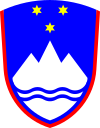
The prime minister of India is the head of government of the Republic of India. Executive authority is vested in the prime minister and his chosen Council of Ministers, despite the president of India being the nominal head of the executive. The prime minister has to be a member of one of the houses of bicameral Parliament of India, alongside heading the respective house. The prime minister and his cabinet are at all times responsible to the Lok Sabha.
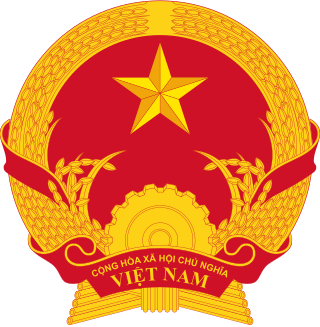
The Government of the Socialist Republic of Vietnam is the executive branch and body of the state administration of Vietnam. The members of the Government are appointed by the President of Vietnam on the advice of the Prime Minister of Vietnam and approved by the National Assembly. The Government is led by the Communist Party of Vietnam (CPV), which is headed by the CPV general secretary, often seen as the highest political post in Vietnam.

The Privy Council Office is the central agency of the Government of Canada which acts as the secretariat to the Cabinet of Canada – a committee of the King's Privy Council for Canada – and provides non-partisan advice and support to the Canadian ministry, as well as leadership, coordination, and support to the departments and agencies of government.
Public Safety Canada, legally incorporated as the Department of Public Safety and Emergency Preparedness (PSEPC), is the department of the Government of Canada responsible for (most) matters of public safety, emergency management, national security, and emergency preparedness in Canada.

The Ministry of Civil Defence, Emergencies and Disaster Relief is a Russian government agency overseeing the civil emergency services in Russia.
The National Security Council (NSC) of India is an executive government body tasked with advising the prime Minister of India on matters of national security and foreign policy. It was established by the former prime minister of India Atal Bihari Vajpayee on 19 November 1998, with Brajesh Mishra as the first National Security Advisor.

The National Command Authority (NCA) is the authority responsible for safeguarding the national security of Pakistan through command, control and operational decisions regarding Pakistan's nuclear weapons programme.

The Department of the Prime Minister and Cabinet (PM&C) is a department of the Australian Government with broad-ranging responsibilities; notably, intergovernmental and whole of government policy coordination and assisting the prime minister of Australia in managing the Federal Cabinet. The PM&C was established in 1971 and traces its origins back to the Prime Minister's Department established in 1911.
An ex officio member is a member of a body who is part of it by virtue of holding another office. The term ex officio is Latin, meaning literally 'from the office', and the sense intended is 'by right of office'; its use dates back to the Roman Republic.
The National Security Council (NSC) of Sri Lanka is the executive body of the Sri Lankan government that is charged with the maintenance of national security with authority to direct the Sri Lankan military and Police.
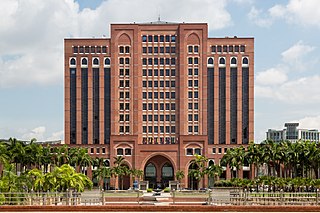
The Ministry of Home Affairs, abbreviated KDN, MOHA, is a ministry of the Government of Malaysia that is responsible for home affairs: law enforcement, public security, public order, population registry, immigration, foreign workers, management of societies, anti-drug, publication / printing / distribution of printed materials, film control, management of volunteer, rehabilitation and implementation of punishment.

The First Filat Cabinet was the Cabinet of Moldova between September 25, 2009, and January 14, 2011. It was a caretaker cabinet from the election of November 28, 2010, until it was succeeded by the Second Filat Cabinet on January 14, 2011.

The Malaysian National Security Council (NSC) (Malay: Majlis Keselamatan Negara Malaysia (MKN), Jawi: مجليس کسلامتن نݢارا مليسيا) is a federal agency under the Prime Minister's Department. NSC is the agency responsible for coordinating Malaysia's national security policies and responses. It oversees public order, defense, and essential services at all levels of government. The NSC adapts to emerging threats and issues directives to guide the country's security efforts.
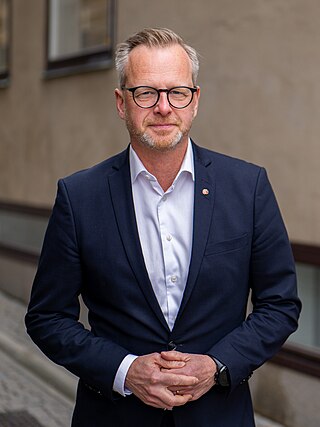
Lars Mikael Damberg is a Swedish politician of the Social Democratic Party. He served as Minister for Finance from 2021 to 2022. He previously served as Minister for Enterprise from October 2014 to January 2019 and as minister for home affairs from January 2019 to November 2021.
The Czech Republic Intelligence System (IS) is responsible for the collection, analysis, reporting and dissemination of intelligence on threats to the Czech Republic, both foreign and domestic. It is also responsible for collecting intelligence on foreign nations, organisations, person and groups. The IS is vital towards the protection and promotion of the Czech Republic and its interests. The major priorities of the systems are determined by the executive power. The activities on the IS must follow the respective laws. The President of the Czech Republic can request for information to be collected without the government's approval but with their knowledge.

The Appointments Committee of the Cabinet (ACC) is a high-level committee within the Government of India responsible for appointing senior officials to key positions in the central government and public sector undertakings. Established in 1950, the ACC is chaired by the Prime Minister of India and includes the Minister of Home Affairs as a member. The committee plays a crucial role in selecting and appointing individuals to various top posts, including the Principal Secretary to the Prime Minister of India, National Security Advisor, Cabinet Secretary, Chief of Defence Staff, Secretaries to Government of India, and heads of intelligence agencies, among others. The ACC's decisions are processed through the Establishment Officer's Division of the Department of Personnel and Training, which functions as the committee's secretariat. As one of the eight Cabinet Committees of India, the ACC's composition and functions are designed to ensure efficient and transparent selection processes for critical government positions.
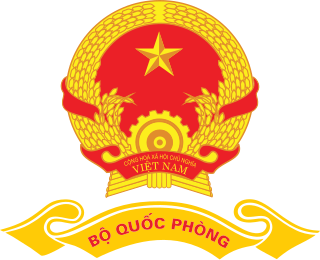
The Minister of National Defence is the Government of Vietnam member in charge of the Ministry of National Defence. The Minister is responsible for the formal executive management functions of state for defense. By Vietnamese politics' design, the assigned Defence Minister also automatically assumes the positions of Deputy Secretary of the Central Military Commission (CMC), member of the Politburo and member of the Council for National Defense and Security, by that the Defence Minister is practically the highest-ranking military officer and politically the second-highest leader of the Vietnam People’s Army as well as the Militia and Self-Defence Force, just under the General Secretary of the Communist Party of Vietnam - who serves ex officio as the Secretary of the Central Military Commission. The current Defence Minister is Army General Phan Văn Giang, since 8 April 2021.

Koen Geens is a Belgian jurist and politician of the Christian Democratic and Flemish (CD&V) who served as the Minister of Justice and as Deputy Prime Minister in the governments of Prime Ministers Charles Michel and Sophie Wilmès.
The Department of Home Affairs is a department of the Government of Australia that is charged with responsibilities for national security, protective services, emergency management, border control, immigration, refugees, citizenship, transport security and multicultural affairs. The Home Affairs portfolio reports to the Minister for Home Affairs, currently held by Tony Burke, and is led by the Secretary of the Department of Home Affairs, Stephanie Foster.
The Republic of Korea has no officially recognized South Korean order of precedence, yet the Office of the President (EOP) once officially declared order of precedence among the chiefs of 6 highest constitutional institutions in year 2006 as following:
- the President of the Republic of Korea, as both head of state and leader of government
- the Speaker of the National Assembly, as leader of legislature
- the Chief Justice of the Supreme Court and the President of the Constitutional Court, as co-leader of the judiciary
- the Prime Minister, as deputy leader of government
- the Chairperson of the National Election Commission, as leader of the constitutionally independent agency for national election administration
